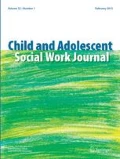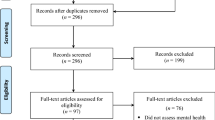Abstract
This study examined knowledge of and attitudes toward services among 268 17-year olds with psychiatric diagnoses preparing to exit foster care. A structured interview assessed knowledge of services with vignette scenarios and attitudes with a standardized scale. Descriptive statistics described the extent of knowledge and attitudes among this population and regression analyses examined predictors of these dimensions of literacy. Most youth suggested a help source, but responses often lacked specificity. Gender and depression were the strongest predictors of knowledge and attitudes, respectively. Knowing which aspects of literacy are low, and for whom, can inform education efforts to improve access to care in adulthood.
Similar content being viewed by others
References
Abram, K. M., Paskar, L. D., Washburn, J. J., & Teplin, L. (2008). Perceived barriers to mental health services among youths in detention. Journal of the American Academy of Child and Adolescent Psychiatry, 47(3), 301–308.
Anda, R. F., Whitfield, C. L., Felitti, V. J., Chapman, D., Edwards, V. J., Dube, S. R., et al. (2002). Adverse childhood experiences, alcoholic parents, and later risk of alcoholism and depression. Psychiatric Services, 53(8), 1001–1009.
Barth, R. P. (1990). On their own: the experiences of youth after foster care. Child and Adolescent Social Work Journal, 7(5), 419–440.
Bernstein, D. P., & Fink, L. (1998). The child trauma questionnaire manual. San Antonio: The Psychological Corporation.
Chandra, A., & Minkovitz, C. S. (2006). Stigma starts early: Gender differences in teen willingness to use mental health services. Journal of Adolescent Health, 38, 754.e1–754.e8.
Chapman, D. P., Whitfield, C. L., Felitti, V. J., Dube, S. R., Edwards, V. J., & Anda, R. F. (2004). Adverse childhood experiences and the risk of depressive disorders in adulthood. Journal of Affective Disorders, 82(2), 217–225.
Copeland, W. E., Shanahan, L., Costello, J., & Angold, A. (2009). Childhood and adolescent psychiatric disorders as predictors of young adult disorder. Archives of General Psychiatry, 66(7), 764–772.
Cotton, S. M., Wright, A., Harris, M. G., Jorm, A. J., & McGorry, P. D. (2006). Influence of gender on mental health literacy. Australian and New Zealand Journal of Psychiatry, 40, 790–796.
Courtney, M. E., & Dworsky, A. (2006). Early outcomes for young adults transitioning from out-of-home care in the USA. Child and Family Social Work, 11(3), 209–219.
Dascalu, M., Compton, W. M., Horton, J. C., & Cottler, L. B. (2001). Validity of DIS-IV in diagnosing depression and other psychiatric disorders among substance users. Drug and Alcohol Dependence, 63, 37, cited at http://epi.wustl.edu/dis/disPSYCHOMETRICPROPERTIES_NEW.htm. Accessed 31 Aug 2010.
David-Ferdon, C., & Kaslow, N. J. (2008). Evidence-based psychosocial treatments for child and adolescent depression. Journal of Clinical Child and Adolescent Psychology, 37(1), 62–104.
Donovan, J. E., & Jessor, R. (1985). Structure of problem behavior in adolescence and young adulthood. Journal of Consulting and Clinical Psychology, 53(6), 890–904.
Fischer, E. H., & Turner, J. L. (1970). Orientations to seeking professional help: Development and research utility of an attitude scale. Journal of Consulting and Clinical Psychology, 35, 79–90.
Gonzalez, J. M., Alegria, M., & Prihoda, T. J. (2005). How do attitudes toward mental health treatment vary by age, gender, and ethnicity/race in young adults? Journal of Community Psychology, 33(5), 611–629.
Horton, J., Compton, W. M., & Cottler, L. B. (1998). Assessing psychiatric disorders among drug users: Reliability of the revised DIS-IV. In L. Harris (Ed.), NIDA research monograph- problems of drug dependence. Washington, DC: NIH Publication No. 99-4395, cited at http://epi.wustl.edu/dis/disPSYCHOMETRICPROPERTIES_NEW.htm. Accessed 31 Aug 2010.
Horwitz, S. M., Hoagwood, K., Stiffman, A. R., Summerfeld, T., Weisz, J. R., Costello, E. J., et al. (2001). Reliability of the services assessment for children and adolescents. Psychiatric Services, 52(8), 1088–1094.
Jorm, A. F. (2000). Mental health literacy: Public knowledge and beliefs about mental disorders. The British Journal of Psychiatry, 177, 396–401.
Jorm, A. F., Kortean, A. E., Jacomb, P. A., Christensen, H., Rodgers, B., & Pollitt, P. (1997). Mental Health Literacy: A survey of the public’s ability to recognise mental disorders and their beliefs about the effectiveness of treatment. Medical Journal of Australia, 166, 182–186.
Lauber, C., Ajdacic-Gross, V., Fritschi, N., Stulz, N., & Rossler, W. (2005). Mental health literacy in an educational elite—an online survey among university students. BMC Public Health, 5(44), 1–9.
Lee, B. R., Munson, M. R., Ware, N. C., Ollie, M. T., Scott, L. D., & McMillen, J. C. (2006). Experiences of and attitudes toward mental health services among older youths in foster care. Psychiatric Services, 57, 487–492.
McMillen, J. C., & Raghavan, R. (2009). Pediatric to adult mental health service use of young people leaving the foster care system. Journal of Adolescent Health, 44(1), 7–13.
McMillen, J. C., Zima, B. T., Scott, L. D., Auslander, W. E., Munson, M. R., Ollie, M., et al. (2005). Prevalence of psychiatric disorders among older youths in the foster care system. Journal of the American Academy of Child and Adolescent Psychiatry, 44(1), 88–95.
McMillen, J. C., Zima, B., Scott, L. D., Ollie, M., Munson, M. R., & Spitznagel, E. (2004). The mental health service use of older youth in foster care. Psychiatric Services, 55(7), 811–817.
Mojtabai, R. (2007). Americans’ attitudes toward mental health treatment seeking: 1990–2003. Psychiatric Services, 58, 642–654.
Morgan, A., & Jorm, A. (2007). Awareness of beyondblue: The national depression initiative in Australian young people. Australasian Psychiatry, 15(4), 329–333.
Munson, M. R., Floersch, J. E., & Townsend, L. (2009). Attitudes toward mental health services and illness perceptions among adolescents with mood disorders. Child and Adolescent Social Work Journal, 26(5), 447–466.
Myers, K. (1994). Comprehensive addiction severity index for adolescents. In T. McClellan & R. Dembo (Eds.), Screening and assessment of alcohol- and other drug-abusing adolescents. Rockville, MD: Substance Abuse and Mental Health Services Administration.
Myers, K., Hagan, T. A., McDermott, P., Webb, A., Randall, M., & Frantz, J. (2006). Factor structure of the Comprehensive Adolescent Severity Inventory (CASI): Results of reliability, validity, and generalizability analyses. The American Journal of Drug and Alcohol Abuse, 32, 287–310.
Rickwood, D. J., Deane, F. P., & Wilson, C. J. (2007). When & how do young people seek professional help for mental health problems. Medical Journal of Australia, 187(7), S35–S39.
Robins, L., Cottler, L., Bucholz, K., & Compton, W. (1995). Diagnostic interview schedule for DSM-IV. St. Louis: Washington University in St. Louis.
Roeloffs, C., Sherbourne, C., Unutzer, J., Fink, A., Tang, L., & Wells, K. B. (2003). Stigma and depression among primary care patients. General Hospital Psychiatry, 25, 311–315.
Russell, D. E. H. (1986). The secret trauma: Incest in the lives of girls and women. New York, NY: Basic Books.
Saunders, J. A., Morrow-Howell, N., Spitznagel, E., Dore, P., Proctor, E. K., et al. (2006). Imputing missing data: A comparison of methods for social work researchers. Social Work Research, 30(1), 19–31.
Sawyer, S. M., & Aroni, R. A. (2005). Self-management in adolescents with chronic illness. What does it mean and how can it be achieved? Medical Journal of Australia, 138(8), 405–409.
Schomerus, G., Matchinger, H., & Angermeyer, M. C. (2009). The stigma of psychiatric treatment and help-seeking intentions for depression. European Archives of Psychiatry and Clinical Neuroscience, 259(5), 298–306.
Scott, J., & Pope, M. (2002). Nonadherence with mood stabilizers: Prevalence and predictors. The Journal of Clinical Psychiatry, 63(5), 384–390.
Stiffman, A. R., Horwitz, S. M., & Hoagwood, K. (2000). The Service Assessment for Children and Adolescents (SACA): Adult and child reports. Journal of American Academy of Child and Adolescent Psychiatry, 39, 1032–1039.
Tamres, L. K., Janicki, D., & Helgeson, V. S. (2002). Differences in coping behavior: A meta- analytic review and an examination of relative coping. Personality and Social Psychology Review, 6(1), 2–30.
Teplin, L. A., Abram, K. M., McClelland, G. M., Dulcan, M., & Mericle, A. A. (2002). Psychiatric disorders in youth in juvenile detention. Archives of General Psychiatry, 59, 1133–1143.
United States Department of Health and Human Services. (2008). Adoption and Foster Care Analysis and Reporting System (AFCARS) Report: Preliminary FY 2006 Estimates as of January 2008 (14). Washington DC: Administration for Children and Families, Children’s Bureau.
Wang, P. S., Berglund, P. A., Olfson, M., Pincus, H., Wells, K., & Kessler, R. C. (2005). Failure and delay in initial treatment contact after first onset of mental disorders in the National Comorbidity Survey Replication. Archives of General Psychiatry, 62, 603–613.
Author information
Authors and Affiliations
Corresponding author
Rights and permissions
About this article
Cite this article
Munson, M.R., Narendorf, S.C. & McMillen, J.C. Knowledge of and Attitudes Towards Behavioral Health Services Among Older Youth in the Foster Care System. Child Adolesc Soc Work J 28, 97–112 (2011). https://doi.org/10.1007/s10560-010-0223-8
Published:
Issue Date:
DOI: https://doi.org/10.1007/s10560-010-0223-8



